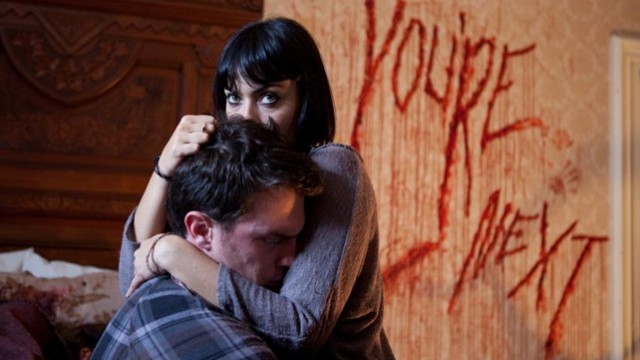How does one review a movie that you can’t decide whether it’s a tease, a success, or a disappointment. Should I review it based on what’s in front of me? Or, can I review it on what the movie could have been? Or, what if I reviewed it against the movies it steals from? You’re Next poses the possibility that it could have been something, but ends up being something less than the sum of its parts.
You’re Next opens by stealing from Scream with an initial kill of a couple in a house that has large bay windows. Wingard knows he’s stealing, blatantly, from the structure of Scream, and changes it to reflect the nature of his movie, that of stylish emptiness and transparency. The opening sequence has the title of the movie painted in blood on glass doors before the male of the couple gets killed. But, to what end? Is this just a game?
Which brings us to the next scene, which is a couple traveling through a forest to their remote vacation house, very much in the style of Funny Games, only without screaming black metal on the soundtrack. By the end of the movie, we’ll also get Agatha Christie’s …And Then There Were None, The Strangers, and Home Alone all being directly referenced, as well as blending in any number of dysfunctional family dramedies.
Over the course of a night, a family unites for the celebration of their parents’ 35th anniversary, but then the family is terrorized by a group of animal-mask wearing murderers. The main girl, however, turns out to be more Macaulay Culkin than final victim, and fights back to their detriment. Of course, twists happen that most people can see 70 minutes in advance.
Wingard’s screenplay flirts with political aspirations. In the opening scene with the main couple, the son reveals to his girlfriend that his father became rich by working in defense. But, this is never brought up again. By the end, Wingard has flirted with student loans, debt, socioeconomic difference, and financial difference, but never with any real aspirations. Cheap Thrills, this is not. But, why bring up all of these facts when you’re just littering your screenplay with hints of relevancy?
You’re Next suffers from too many references, and too much potential litter. Yet, when it works, it works. The style of the movie, though suffering from Wingard’s now-signature overuse of handheld camera, can be effectively creepy and hilarious when it wants. If streamlined, the movie could have been a bullet train from hell that would energize the masses. But, even at 87 minutes, the movie’s dialogue and arguing weighs down the movie, and the twists and turns add up to little more than sideshow amusement.
So, how do I even review this? When it’s on, it’s dead on hilarious, but when it’s off it’s clunky as hell. But, when it’s off it’s only off because its clunkiness promises more than the movie delivers, and if you just take You’re Next at face value, the movie probably works wonders. Either way, I think it’s wasted potential.

